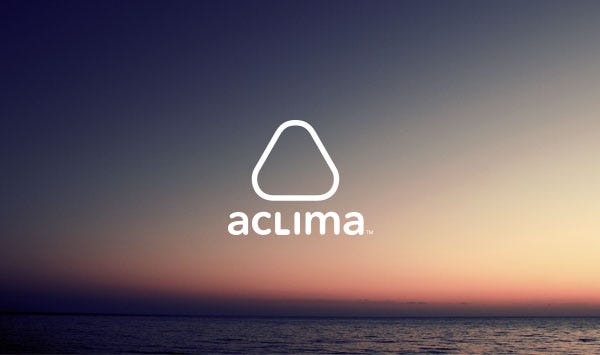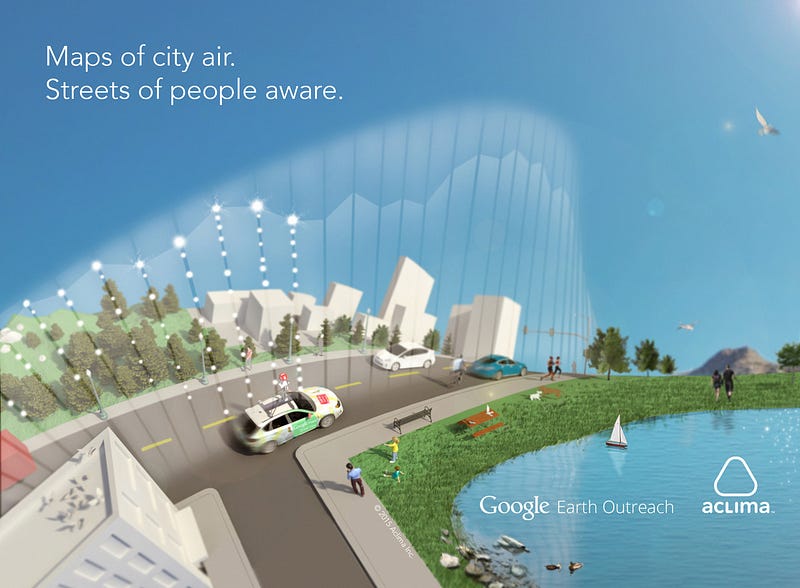Aclima Comes Out of Stealth, Announces Partnerships with Google, EPA, and Lawrence Berkeley National Labs
Partnerships advance Aclima Sensory Science™, making environmental quality visible through distributed sensor networks
SAN FRANCISCO (June 30, 2015) — Aclima Inc., a San Francisco-based company that designs and deploys environmental sensor networks, today unveiled its work and announced partnerships with Google Inc., the U.S. Environmental Protection Agency (EPA), and Lawrence Berkeley National Laboratory. Additionally, the company named an advisory board of luminaries to guide Aclima’s mission-driven work.
“We’re on a big, ambitious mission at Aclima to usher in an age of environmental awareness that creates a more resilient, healthy and thriving world,” said Davida Herzl, co-founder and CEO of Aclima. “There is a growing need — for businesses, governments and citizens alike — to ‘Live Aware’ by first understanding, and then improving our built and natural environments. Aclima has spent years in stealth creating a complete system to map environmental quality in an entirely new way, enabling us to see how our buildings, communities and cities live and breathe.”
To achieve its mission, Aclima’s team of designers, engineers and scientists built a full-stack hardware and software platform for measuring and understanding environmental quality in real-time. Aclima’s modular and scalable networks of internet-connected sensors generate billions of data points across a range of environmental factors. Each sensor network is customized to meet the needs of enterprise and government partners — whether a partner is interested in mapping greenhouse gases across an entire city, or air pollutants that affect human health inside commercial buildings.
The company’s cloud-based back-end and modular front-end tools process, analyze, and visualize limitless amounts of environmental data, enabling Aclima scientists and partners to discover real-time and long-term insights. With its managed infrastructure tools, Aclima ensures network reliability and optimal data quality. Aclima works hand-in-hand with partners to explore their spaces and apply insights toward optimal decision making. Aclima refers to this unique service model, combining technology and data-driven insights, as Sensory ScienceTM.
One of Aclima’s most significant enterprise partners to date is Google. For several years, Google and Aclima have worked together to deploy a global indoor environmental sensor network — the first of its kind — connected across 21 Google offices around the world. Five hundred networked Aclima devices currently process 500,000,000 data points each day on indoor environmental quality, including comfort measures of temperature, humidity, noise, and light, and emissions like carbon dioxide and particulate matter. The information allows Google to evaluate environmental factors in their offices and, in the future, make better decisions on workplace design to support employee wellbeing, productivity and creativity.
“Working with Aclima has helped us to bring together the best thinking, science, and technology to support Googlers in a new and innovative way,” said Anthony Ravitz from Google Real Estate and Workplace Services. “We strive to create the healthiest and best possible work environments for Googlers. Our vision is to create buildings that seamlessly support the people who inhabit them. Using Aclima’s science-driven sensor networks to map our indoor environmental quality is a big part of making that happen.”
To push the limits of current sensing technology, Aclima has established scientific and research relationships of the highest caliber. In 2013, Aclima and the EPA signed a Cooperative Research and Development Agreement (CRADA). The collaboration brings together EPA scientists with Aclima’s Research and Development team to improve data quality from small-scale sensors. The partnership is advancing Aclima’s measurement methods for its stationary and vehicular sensing platforms.
“With increasing public awareness and concern about air quality in communities, there’s an urgent call for publicly accessible local environmental data and air quality information, both indoors and outdoors,” said Dan Costa, National Program Director for Air, Climate, and Energy Program at EPA. “We’re excited to partner with Aclima to develop new sensor technologies and to conduct research that will provide more accessible, less expensive and more reliable data on air pollutants needed by decision makers in the public and private sectors to better understand the air we breathe.”
Aclima also leads a cross-sector collaboration with Lawrence Berkeley National Lab, UC Berkeley, University of Illinois at Chicago, and the EPA to engineer and commercialize a miniaturized particulate matter sensor — the smallest sensor of its kind — for the air pollutant most responsible for respiratory health problems, like asthma.
“Bringing a small-scale sensor of this type to market will help us to effectively measure particle pollution, which has been linked to a wide range of serious health problems,” said Dr. Lara Gundel, Staff Scientist at Berkeley Lab. “At Berkeley Lab we have been at the forefront of environmental sensing research, and our partnership with Aclima will bring this innovation out of the lab and into the market.”
Aclima began its startup journey with a belief that businesses can become market leaders by driving beneficial social change. Rather than focusing on a ‘minimum viable product’, Aclima’s founders sought a growth and partnership approach aimed at achieving ‘maximum societal impact.’ This approach supports the company’s ultimate vision of a real-time, dynamic, global layer of dense environmental data that gives society the tools to optimize human and planetary health.
“Understanding the link between planetary health and human health has never been more pressing,” said Herzl. “Aclima is working to make this invisible connection visible, on a grand scale and across industries. Having bootstrapped the company with revenue, grounded in strong business fundamentals, we’re excited to start sharing our work with the world. It is an honor to have Google, EPA, LBNL and our incredible advisory board working with us. The potential represented by this group is truly inspiring.”
Aclima Advisory Board members include luminaries such as: Jane Lubchenco, former Administrator of The National Oceanic and Atmospheric Administration (NOAA) under President Barack Obama; William K. Reilly, former Administrator of the EPA and Senior Advisor to TPG Capital; Peter Senge, Senior Lecturer at MIT School of Management, pioneer in systems science and author of “The Fifth Discipline”; Elad Gil, Serial entrepreneur and former VP of Corporate Strategy for Twitter; Greg Niemeyer, Professor at UC Berkeley and Director of the Berkeley Center for New Media; David Sherman, co-author of the “Flourishing Enterprise” and distinguished fellow at the Fowler Center for Sustainable Value; and Martin Goebel, Founder of Sustainable Northwest and former country president for World Wildlife Fund and Conservation International.

Share this
You May Also Like
These Related Stories

Introducing a Sense of Aclima

Aclima and Google Partner to Map Outdoor Air Quality with Street View Vehicles

/2022_Aclima_Logo_Mist_500px_wR.png?width=501&height=193&name=2022_Aclima_Logo_Mist_500px_wR.png)
